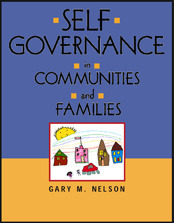We are entering the 21st century in a period of great uncertainty and change. People are wary of government and have lost confidence in social institutions-from social welfare and schools to healthcare programs. That loss of confidence has undermined the community and family life that is the very foundation of our society. Self-Governance in Communities and Families shows how individuals can reconnect to and revitalize their social institutions so that they are effective in serving the needs of all.
Gary Nelson identifies the existing social models we are moving away from and explores the new, emerging pattern of relationships we are shifting to in our social institutions. He reveals why open dialogue and partnerships between people and their social institutions are essential to the well-being of families and thriving communities. He describes why social regeneration is best pursued through these partnerships, with people and stakeholders within communities taking positive action to develop and protect the well-being of their families and the health of their communities.
Applying both business and social science concepts to the day-to-day management of social institutions, Nelson offers a proven, practical method-community self-governance dialogues-for engaging people in the redesign and revitalization of social institutions. The author shows how-by creating opportunities for individuals and families to proactively participate in developing a strategic plan for how their institutions are managed, run, and evaluated-this dialogue method ultimately empowers people to take control of their own lives. He also reveals how active participation in these open dialogues ignites creative ideas and new energy for the redirection and reshaping of those institutions.
With numerous examples and anecdotes, Nelson illustrates the values, beliefs, and principles that underlie how we learn and make decisions in a self-governing democratic culture. He provides tips for shared learning and accountability, ownership and governance, and the creation of a culture of self-governance. And he offers advice on how to maintain an ongoing engagement and partnership between the public and its social institutions.
Communities and families can be strengthened when each of us takes responsibility for ourselves and works in partnership with others to restore our social institutions. Self-Governance in Communities and Families sets forth clear, doable strategies for fostering both responsibility and ownership through dialogue and collaboration between public and private sectors.
- Provides community leaders and others with a framework for bringing all parts of a community and the "system" together around the common purpose of strengthening communities and families
- Outlines a philosophy of self-governance and empowerment for at-risk families, individuals, and neighborhood communities
- Offers managers a dynamic, adaptive model for opening up, supporting, and steering the process of social change
Find out more about our Bulk Buyer Program
- 10-49: 20% discount
- 50-99: 35% discount
- 100-999: 38% discount
- 1000-1999: 40% discount
- 2000+ Contact ( bookorders@bkpub.com )
We are entering the 21st century in a period of great uncertainty and change. People are wary of government and have lost confidence in social institutions-from social welfare and schools to healthcare programs. That loss of confidence has undermined the community and family life that is the very foundation of our society. Self-Governance in Communities and Families shows how individuals can reconnect to and revitalize their social institutions so that they are effective in serving the needs of all.
Gary Nelson identifies the existing social models we are moving away from and explores the new, emerging pattern of relationships we are shifting to in our social institutions. He reveals why open dialogue and partnerships between people and their social institutions are essential to the well-being of families and thriving communities. He describes why social regeneration is best pursued through these partnerships, with people and stakeholders within communities taking positive action to develop and protect the well-being of their families and the health of their communities.
Applying both business and social science concepts to the day-to-day management of social institutions, Nelson offers a proven, practical method-community self-governance dialogues-for engaging people in the redesign and revitalization of social institutions. The author shows how-by creating opportunities for individuals and families to proactively participate in developing a strategic plan for how their institutions are managed, run, and evaluated-this dialogue method ultimately empowers people to take control of their own lives. He also reveals how active participation in these open dialogues ignites creative ideas and new energy for the redirection and reshaping of those institutions.
With numerous examples and anecdotes, Nelson illustrates the values, beliefs, and principles that underlie how we learn and make decisions in a self-governing democratic culture. He provides tips for shared learning and accountability, ownership and governance, and the creation of a culture of self-governance. And he offers advice on how to maintain an ongoing engagement and partnership between the public and its social institutions.
Communities and families can be strengthened when each of us takes responsibility for ourselves and works in partnership with others to restore our social institutions. Self-Governance in Communities and Families sets forth clear, doable strategies for fostering both responsibility and ownership through dialogue and collaboration between public and private sectors.
- Provides community leaders and others with a framework for bringing all parts of a community and the "system" together around the common purpose of strengthening communities and families
- Outlines a philosophy of self-governance and empowerment for at-risk families, individuals, and neighborhood communities
- Offers managers a dynamic, adaptive model for opening up, supporting, and steering the process of social change









